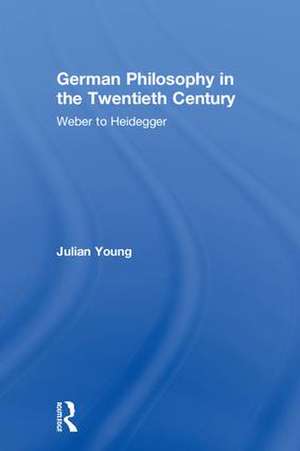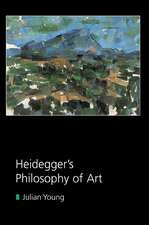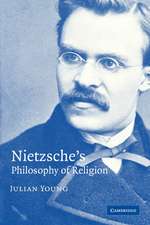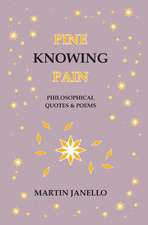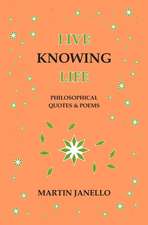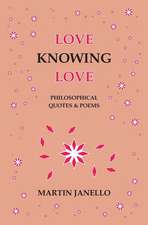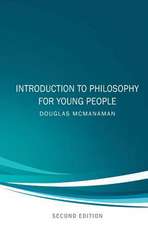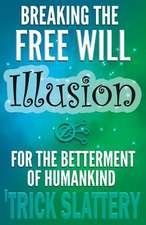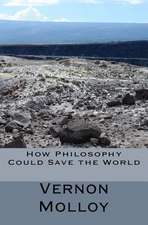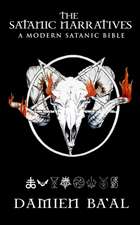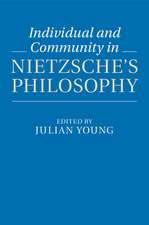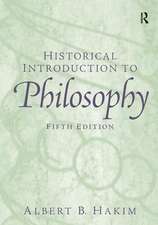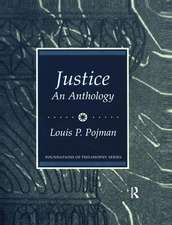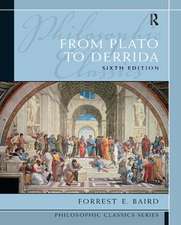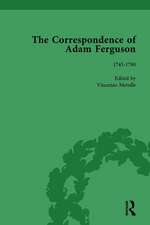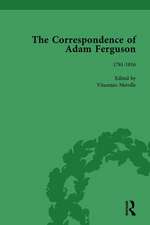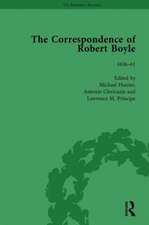German Philosophy in the Twentieth Century: Weber to Heidegger
Autor Julian Youngen Limba Engleză Hardback – 29 mai 2018
In this outstanding introduction, Julian Young explains and assesses the two dominant traditions in modern German philosophy – critical theory and phenomenology – by examining the following key thinkers and topics:
- Max Weber’s setting the agenda for modern German philosophy: the ‘rationalization’ and ‘disenchantment’ of modernity resulting in ‘loss of freedom’ and ‘loss of meaning’
- Horkheimer and Adorno: rationalization and the ‘culture industry’
- Habermas’ defence of Enlightenment rationalization, the ‘unfinished project of modernity’
- Marcuse: a Freud-based vision of a repression-free utopia
- Husserl: overcoming the ‘crisis of humanity’ through phenomenology
- Early Heidegger’s existential phenomenology: ‘authenticity’ as loyalty to ‘heritage’
- Gadamer and ‘fusion of horizons’
- Arendt: the human condition
- Later Heidegger: the re-enchantment of reality.
| Toate formatele și edițiile | Preț | Express |
|---|---|---|
| Paperback (3) | 293.90 lei 3-5 săpt. | +41.00 lei 7-13 zile |
| Taylor & Francis – 5 iul 2022 | 293.90 lei 3-5 săpt. | +41.00 lei 7-13 zile |
| Taylor & Francis – 25 mai 2018 | 354.89 lei 6-8 săpt. | |
| Taylor & Francis – 26 oct 2020 | 365.87 lei 6-8 săpt. | |
| Hardback (3) | 1000.27 lei 6-8 săpt. | |
| Taylor & Francis – 26 oct 2020 | 1000.27 lei 6-8 săpt. | |
| Taylor & Francis – 29 mai 2018 | 1000.27 lei 6-8 săpt. | |
| Taylor & Francis – 5 iul 2022 | 1001.21 lei 6-8 săpt. |
Preț: 1000.27 lei
Preț vechi: 1219.84 lei
-18% Nou
Puncte Express: 1500
Preț estimativ în valută:
191.40€ • 200.37$ • 158.37£
191.40€ • 200.37$ • 158.37£
Carte tipărită la comandă
Livrare economică 05-19 aprilie
Preluare comenzi: 021 569.72.76
Specificații
ISBN-13: 9781138220003
ISBN-10: 1138220000
Pagini: 278
Dimensiuni: 156 x 234 x 18 mm
Greutate: 0.45 kg
Ediția:1
Editura: Taylor & Francis
Colecția Routledge
Locul publicării:Oxford, United Kingdom
ISBN-10: 1138220000
Pagini: 278
Dimensiuni: 156 x 234 x 18 mm
Greutate: 0.45 kg
Ediția:1
Editura: Taylor & Francis
Colecția Routledge
Locul publicării:Oxford, United Kingdom
Public țintă
Postgraduate and UndergraduateCuprins
Introduction 1. Weber: Rationalization and Disenchantment 2. Horkheimer and Adorno: Irrational Reason 3. Habermas: Lifeworld and System 4. Marcuse: Reason and Pleasure 5. Husserl: Phenomenology and the Crisis of the Sciences 6. Early Heidegger: Existential Phenomenology 7. Gadamer: Truth versus Method 8. Arendt: The Human Condition 9. Later Heidegger: Godless Theology Conclusion. Index
Notă biografică
Julian Young is William R. Kenan Jr. Professor of Humanities and Professor of Philosophy at Wake Forest University, USA. He is the author of thirteen books including Schopenhauer (Routledge, 2005); Friedrich Nietzsche: A Philosophical Biography, which won the Association of American Publishers' 2010 PROSE award for philosophy; The Philosophy of Tragedy: from Plato to Žižek (2013); and The Death of God and the Meaning of Life (2nd edition 2014, Routledge).
Recenzii
'Julian Young’s book on the history of twentieth-century Germanphilosophy is not only a precise, instructive and critical exposition of the work of Adorno, Husserl and Heidegger (among others). It is also a prime example of applied historiographical methodology with respect to some of these problems. Young’s original approach to philosophical historiography resonates throughout the text. His remarkable sensitivity for political and theoretical issues expresses itself through a brilliant and clear prose.' - Francesco Pisano, Phenomenological Reviews
'An incomparably lucid, thoughtful, and provocative introduction to German philosophy in the early twentieth century. Nobody explains the historical contexts and inner dynamics of this period of philosophy more clearly than Julian Young; and no other book on the philosophical foundations of hermeneutics, phenomenology and critical theory is as comprehensive, accessible, and engrossing.' - Stephan Käufer, Franklin & Marshall College, USA
'Julian Young shows that the distance between Frankfurt am Main to Freiburg im Breisgau is less than one thinks. Throughout the twentieth century, both critical theorists and phenomenologists were responding to Max Weber’s modernity critique. Their paths intersected around a cluster of concepts whose family resemblances are unmistakable: rationalization, reification, enframing, one-dimensionality, crisis of humanity, crisis of authority, orientation crisis, etc. Young’s account of these affinities is reliable and provocative.' - Andrew Cutrofello, Loyola University Chicago, USA
'An invaluable map for those who wish to travel, with a judicious guide, from Frankfurt (critical theory) to Freiburg (phenomenology). Young's hypothesis that both philosophical traditions are responding to a crisis in modern life - a crisis of freedom, and perhaps more fundamentally, a crisis of meaning - provides an extremely helpful frame within which we can understand and assess the respective "cures" on offer in some of the very best philosophy of the last century.' - Joseph Schear, University of Oxford, UK
'An incomparably lucid, thoughtful, and provocative introduction to German philosophy in the early twentieth century. Nobody explains the historical contexts and inner dynamics of this period of philosophy more clearly than Julian Young; and no other book on the philosophical foundations of hermeneutics, phenomenology and critical theory is as comprehensive, accessible, and engrossing.' - Stephan Käufer, Franklin & Marshall College, USA
'Julian Young shows that the distance between Frankfurt am Main to Freiburg im Breisgau is less than one thinks. Throughout the twentieth century, both critical theorists and phenomenologists were responding to Max Weber’s modernity critique. Their paths intersected around a cluster of concepts whose family resemblances are unmistakable: rationalization, reification, enframing, one-dimensionality, crisis of humanity, crisis of authority, orientation crisis, etc. Young’s account of these affinities is reliable and provocative.' - Andrew Cutrofello, Loyola University Chicago, USA
'An invaluable map for those who wish to travel, with a judicious guide, from Frankfurt (critical theory) to Freiburg (phenomenology). Young's hypothesis that both philosophical traditions are responding to a crisis in modern life - a crisis of freedom, and perhaps more fundamentally, a crisis of meaning - provides an extremely helpful frame within which we can understand and assess the respective "cures" on offer in some of the very best philosophy of the last century.' - Joseph Schear, University of Oxford, UK
Descriere
The course of German philosophy in the twentieth century is one of the most exciting, diverse and controversial periods in the history of human thought. It is widely studied and its legacy hotly contested. In this outstanding introduction Julian Young explains and assesses the philosophical ideas and arguments of the principal philosophers of the period.
